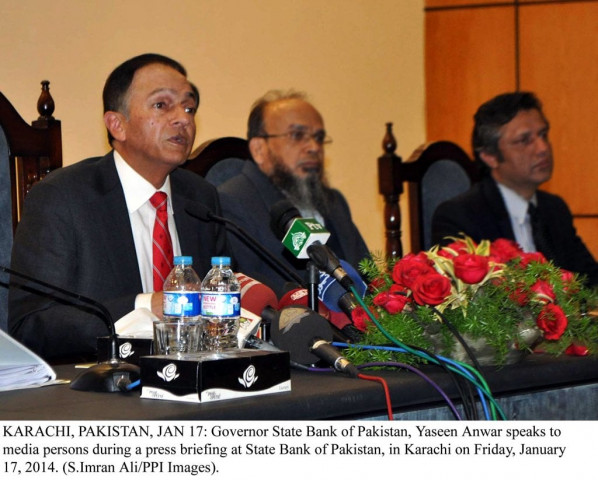Monetary policy statement: Discounting IMF’s advice, SBP keeps rate unchanged
Central bank says risk of demand-driven inflation still moderate.

Governor State bank Yaseen Anwar addressing a press conference at the SBP on January 17, 2013. PHOTO: PPI
In an apparent defiance of the International Monetary Fund (IMF) that wants the State Bank of Pakistan (SBP) to build foreign exchange reserves by increasing the monetary policy rate, the central bank announced on Friday it will keep the rate unchanged at 10% for the next two months.
The monetary policy rate is the interest rate at which commercial banks are allowed to borrow from the central bank’s discount window. The central bank uses this tool to control money supply in the economy and, as a consequence, manage inflation as well as economic growth.
Addressing a press conference at the SBP, Governor Yaseen Anwar said the central bank formulates monetary policy independently. “The IMF has always respected the SBP’s independence. I don’t see any conflict there,” he said.
In a staff report issued in the first week of January, the IMF had noted that firm action was required to address the ‘critically low’ foreign exchange reserves. Noting that the SBP must ‘unhesitatingly’ use every policy tool at its disposal to boost reserves, including adjusting the policy rate, the IMF stated the SBP policies had thus far failed to give sufficient priority to the crucial challenge of rebuilding reserves.

Anwar said the expected increase in inflation is slightly lower than the earlier estimate, which justifies maintaining the rate at 10% for the next two months.
The SBP has increased the policy rate by 100 basis points since the beginning of the current fiscal year. Earlier, it reduced the rate by as many as 300 basis points from June 2012 to June 2013.
“The risk of demand-driven inflation is still rather moderate,” the SBP governor said, adding international commodity prices have also either remained stable or declined since the beginning of fiscal 2014. “This has neutralised, to some extent, the direct impact of exchange rate volatility on CPI inflation. Taking these factors into account, the SBP has accordingly revised its inflation projection downward,” he said.
The SBP expects inflation to remain 10%-11% for fiscal 2014, which is 1% less than its forecast at the beginning of the fiscal year.
The SBP’s optimism with regard to the inflation outlook is based on the latest CPI number. Inflation in December remained 9.18% against 10.91% recorded in the preceding month.
Speaking to The Express Tribune, Alternate Research investment analyst Umesh Kumar said the CPI is expected to decrease further in January. “It’s likely to be around 8.7%-8.8% for January while the figure for fiscal 2014 is expected to be between 9.25% and 9.5%,” said Kumar.
According to Global Securities, the inflation figure for January is expected to be 8.75%. It said the decrease in inflation will improve the real interest rate – which is the difference between inflation and interest rates in an economy – to 1.25% compared to 0.82% in December.
With regard to foreign exchange reserves, Anwar noted that they are finally on the rise after touching $2.9 billion in December. He said that IMF repayments peaked last month and will decrease in subsequent quarters.
The central bank’s foreign exchange reserves increased by $222 million to $3.4 billion on January 10 compared to $3.2 billion in the preceding week. “Going forward, I see stability in foreign exchange reserves,” the SBP governor said.
Published in The Express Tribune, January 18th, 2014.
Like Business on Facebook, follow @TribuneBiz on Twitter to stay informed and join in the conversation.



















COMMENTS
Comments are moderated and generally will be posted if they are on-topic and not abusive.
For more information, please see our Comments FAQ